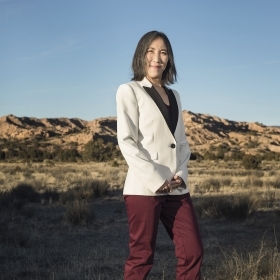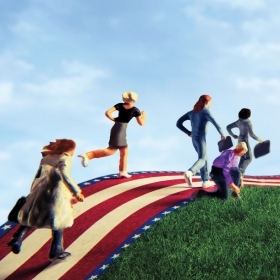Photo by Richard Howard
For decades, when Kay Lehman Schlozman ’68 teaches political parties and elections she tells her students, “We’re going to deal with political matters, and we’re going do it civilly,” she says. During her long tenure at Boston College—and her two semesters at Wellesley this year as Distinguished Visiting Professor of Political Science—those rules have held up.
Only once was that threatened, in 1992, when B.C. campus organizers brought Pat Buchanan’s “pugnacious style” into the classroom, she says. But, for the most part, in Schlozman’s classroom, Republicans and Democrats alike can have amicable, thought-provoking conversations about American politics.
Schlozman, one of the world’s leading political scientists on political participation, guides students as they tackle big questions about the U.S. political system. Is it allowing us to hold our leaders and parties accountable? And what happens when there’s an inequality in political voice? At Wellesley this year, Schlozman has taught Women, Men, and Politics and Inequality and Politics in America. Next year, she returns to her position as J. Joseph Moakley Endowed Professor of Political Science at B.C.
Currently, “we’re in an era where political voice is much more deeply rooted in inequalities in the size of our wallets than it has been in the past,” Schlozman says. It’s a topic she explores in her most recent book, Unequal and Unrepresented: Political Inequality and People’s Voice in the New Gilded Age.
A Chicago native, Schlozman first arrived at Wellesley 55 years ago as a first-year. She found herself drawn to questions about politics. During her junior year, a professor took her to lunch to plan her grad school studies. Schlozman was taken aback. “It was a time when it was much less common for women, even with an elite education, to have these kinds of aspirations,” she says.
She ended up earning her M.A. and Ph.D. in political science from the University of Chicago. When she was hired as a political science professor by Boston College in 1974 at age 27, she was the department’s only woman.
Now, Schlozman is focused on how disparities in political voice are endangering American democracy. Well-educated and affluent people have a stronger voice than those with less money and education, she says. Campaign finance reform can help, “but as they say in Washington, ‘not going to happen,’” she says.
There are small steps we can take, though. Registering high school seniors could make it more likely for people to vote. “This isn’t going to revolutionize American democracy,” Schlozman says, “but tweaks like this can help.”






We ask that those who engage in Wellesley magazine's online community act with honesty, integrity, and respect. (Remember the honor code, alums?) We reserve the right to remove comments by impersonators or comments that are not civil and relevant to the subject at hand. By posting here, you are permitting Wellesley magazine to edit and republish your comment in all media. Please remember that all posts are public.